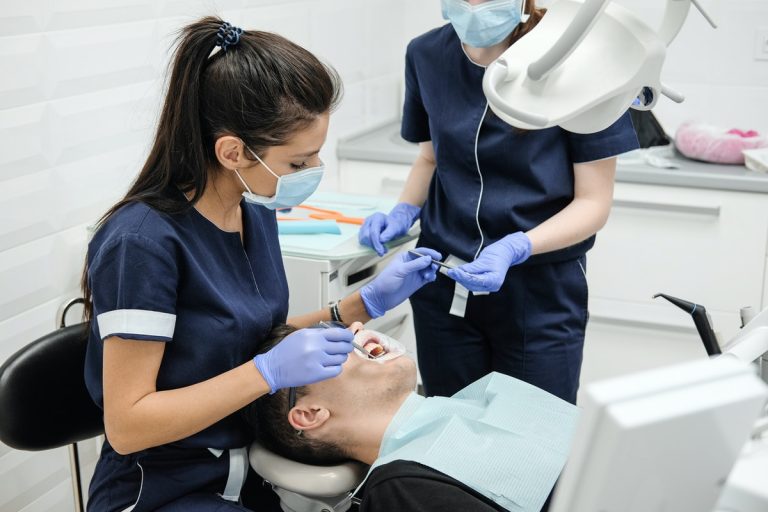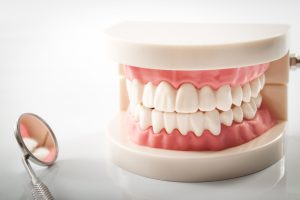Having good dental health is incredibly important for overall health and wellness. Many people often don’t think about the role that dental health plays in their overall well-being, but research has consistently shown that there are a variety of ways in which poor oral care affects other parts of the body. Oral health should not be overlooked or neglected, from impacting heart health to contributing to digestive issues.
Statistics have shown that around 80% of adults have gum disease, and approximately 27% of Americans between the ages of 20 and 64 have untreated tooth decay. Millions of individuals are not taking proper care of their teeth and gums, which can easily lead to more significant problems. Poor dental hygiene can cause inflammation in the gums and jaw, cavities, or even worse conditions like gum disease and periodontal disease. These issues can cause many symptoms, from pain to bad breath and even difficulty eating certain foods if it becomes severe enough.
Dental health is vital, but people might not always know how to take care of their teeth properly. Here are a few tips to help you with the process.
Dental Hygiene Habits
Dental hygiene habits are essential to maintain good dental health. Brushing your teeth twice a day with fluoride toothpaste, flossing regularly, and using an antibacterial mouthwash are all critical habits to practice. It is also essential to see the dentist every six months or as your doctor recommends for routine checkups and cleanings.
Brushing your teeth twice a day helps remove bacteria and plaque from the surfaces of your teeth, preventing cavities and gingivitis. Make sure to brush all surfaces of the teeth, including around the gumline, where plaque builds up quickly. Use gentle circular motions for two minutes, focusing on one section at a time until you have brushed all areas in the mouth. Additionally, use a soft-bristled toothbrush so that you do not damage your gums or enamel while brushing.
Flossing removes food particles and bacteria that can cause tooth decay and inflammation between your teeth, where brushing may not be able to reach. When flossing, pass the floss gently up and down each side of every tooth to ensure that all areas get adequately cleaned.
Mouthwash is also an essential part of oral hygiene. An antibacterial mouthwash can help reduce bad breath, remove food particles, kill bacteria in hard-to-reach places like between teeth or below the gum line, reduce inflammation caused by gingivitis, and more. Using it after brushing or flossing helps protect against dental issues such as periodontal disease or cavities.
Those things should be considered when addressing dental issues. It is vital to take care of your teeth, not only to have healthy teeth and gums but also to ensure that other body parts are not negatively affected by poor oral hygiene habits.

Visit the Dentist Frequently
It is also essential to visit the dentist regularly for checkups, cleanings, and other tests or treatments. A dental professional can spot any problems in their early stages before they become more severe. If any issues are present, they will know how to treat them and help you maintain your oral health.
Regular visits are critical because they allow the dentist to evaluate your overall mouth health and advise you on proper dental care habits like brushing and flossing techniques. Additionally, if you experience any pain or discomfort, notify your dentist so they can determine the cause and provide treatment as soon as possible.
Affordable dental implant procedures will also require the help of a professional. While dental implants can be an excellent solution for missing teeth, a qualified and experienced dentist must have them placed.
Keep a Healthy Lifestyle
Finally, a healthy lifestyle also plays a role in dental health. Eating nutritious foods such as fruits and vegetables can help reduce your risk of tooth decay, while avoiding sugary or acidic drinks like soda and fruit juice can improve oral hygiene.
Unhealthy habits could also increase your risk of developing oral health problems. Smoking can lead to yellowed teeth, gum disease, and tooth loss. Another practice that could damage teeth is drinking alcohol, leading to a dry mouth and an increased risk of cavities.
A healthy lifestyle will be challenging to maintain, but it is essential if you want to have a healthy mouth.
Final Thoughts
By following these steps and taking the necessary precautions, you can minimize your risk of dental issues and maintain good oral health. It would be best if you also considered talking to your dentist about any questions or concerns regarding dental care. Your dentist will be able to provide advice and help ensure that your mouth is healthy.













